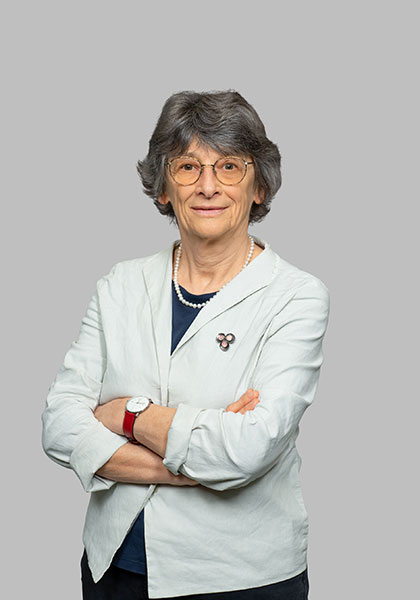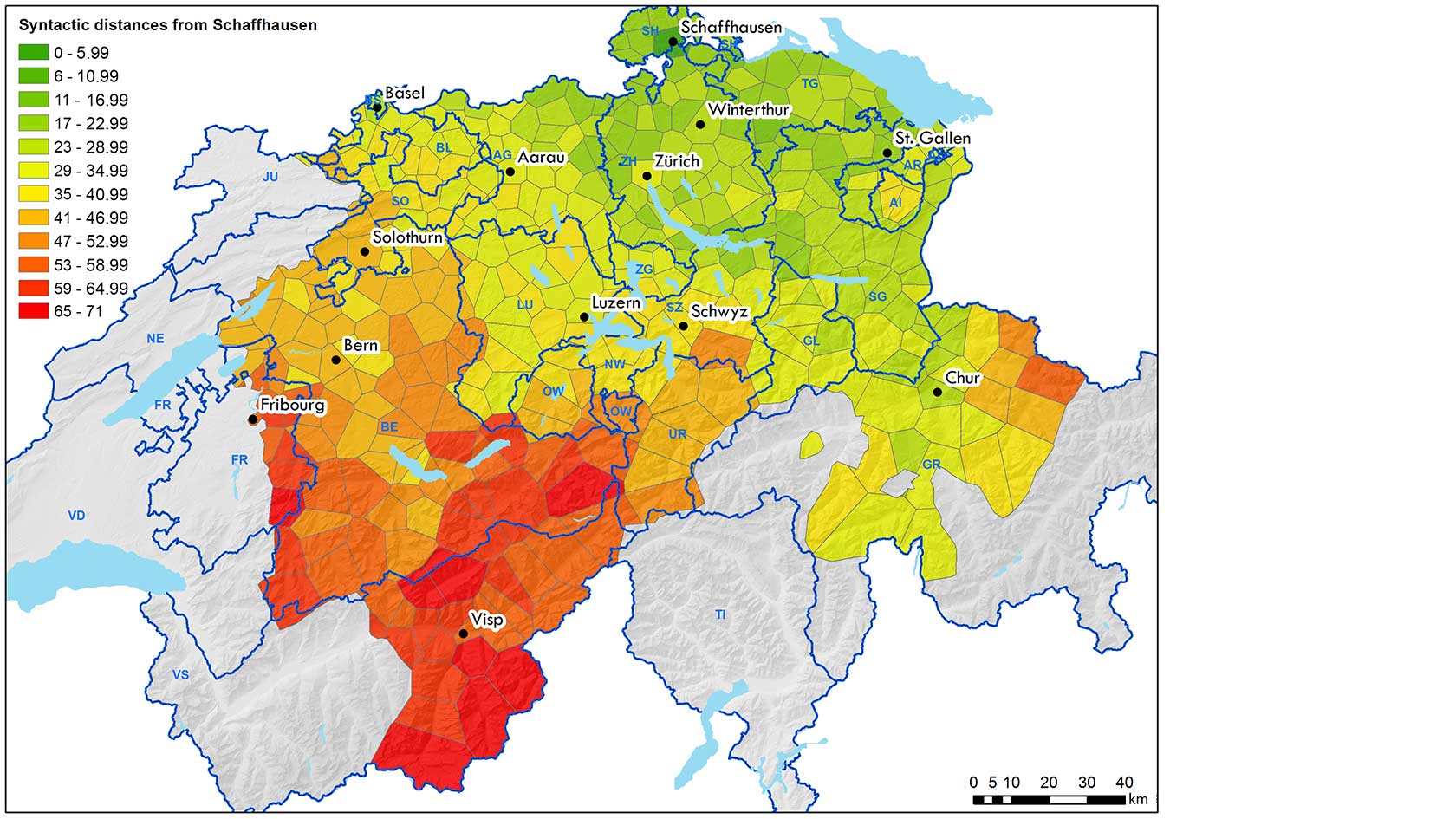Setting New Standards through Interdisciplinary Research
The subject Language and Space was addressed from different perspectives over the course of the URPP. One of the central questions explored during the 12-year research period was how geographical spaces influence the spread of linguistic characteristics and drive the development of dialects and accents. The program also looked at how interactional spaces are continually re-shaped by the perceptions, movements and actions of the participants. Furthermore, the URPP explored how people describe space and what linguistic means they use when referring to spatiality and movement. The research was organized on an interdisciplinary basis, bringing together UZH researchers from the fields of linguistics and geography. “Collaborating with the geographers, who introduced a huge variety of methods, was very enriching for us,” the former co-director Elvira Glaser states.

The subject of language and space generated a considerable public response.
Elvira Glaser, in your opinion, what are the key outcomes of the URPP Language and Space?
Elvira Glaser: The main outcome is that each research group developed new methods for working empirically. In the field of interactional linguistics, for instance, eye trackers were used to explore how a particular space affects a conversation. The eye movements of the conversation participants were recorded and analyzed in order to understand how spacial positioning and visual attention influence the interaction. In another project, 3D scanners were used to model large rooms to explore how spatial arrangements and movements influence the dynamics of communication. The geographers made use of Big Data to analyze geographical distribution and to model where particular languages and dialects come from and how they influence each other. Their approach to certain questions inspired our linguistic research.
The URPP also allowed us to lay the foundation for the Linguistic Research Infrastructure (LiRI) technology platform. Equipped with the latest technologies, the platform enables us to conduct experimental research in phonetics, psycholinguistics and neurolinguistics.
My former co-director Heiko Hausendorf established spatiality of interaction as a research paradigm by examining the impact of different room concepts such as those found in churches, lecture theaters, art spaces, sales areas and meeting places. Today, interactional linguistics isn’t simply about conversation analysis, but also about the influence of the space.
Two reference books summarize the academic achievements of the URPP. The book Pragmatics and Space, edited by Heiko Hausendorf and Andreas Jucker, professor emeritus of English literature and linguistics, has already been published. The other volume on the different language areas of Switzerland bring together the research related to Switzerland. One of them replaces an out of print book on the languages of Switzerland and supplements it with new aspects such as sign language and migration languages.
What outcome personally surprised you the most?
Although establishing our Language and Space lab allowed us to preempt the current technological development, the speed with which this development occurred still surprised me. Linguistics has changed fundamentally, and experimental methods have become indispensable. This paradigm shift took place faster than I had expected.
What’s your view on the societal relevance of this URPP?
As a whole, the subject of language and space generated a considerable public response. I think questions that address the connections between language and space fascinate people because both are closely linked to identity. Interactional spaces create a sense of belonging, and the different language areas of Switzerland form their own spaces and identities.
All our online surveys on dialect variations benefited from a high participation rate. And the teaching materials we put together for the linguistic atlas Kleiner Sprachatlas der deutschen Schweiz have been met with much appreciation. Thanks to the support of the URPP lab, there are also interactive cards to go with it. The LiRI lab enabled researchers to visualize the numerous audio recordings from Stimmen der Schweiz, an archive with sound recordings of Switzerland’s national languages in the early 21st century.
Some of the former URPP members are now using the knowledge gained in phonetics and interactional linguistics in their jobs in forensics or in science centers. Another area of application is in the design of university premises such as the planned FORUM UZH – Heiko Hausendorf was able to contribute his expertise to the planning commission for this.
Taking stock of the URPP Language and Space, what springs to mind?
The URPP succeeded in strengthening collaboration among linguists at the University of Zurich. Today, linguistics isn’t just perceived as a component of individual subjects and departments, but as standalone, cross-departmental discipline. Since 2019, UZH has offered a mono Master’s program in linguistics.
The application of new technologies in data collection and processing, as well as connecting findings in dialectology with linguistic typology and interactional linguistics allowed the URPP to acquire some distinguishing characteristics. I think this enabled us to develop a unique profile that accorded us a prominent position both within Switzerland as well as on a European level.
Looking back on the 12 years of URPP Language and Space, what was the biggest highlight for you?
I remember a particularly stimulating interdisciplinary conference on the subject of borders at the Monte Verità congress and cultural center near Ascona. Researchers from all over the world, from disciplines such as geography, psychology, sociology and linguistics, discussed what defines borders and boundaries, how geographers determine borders and whether these methods also apply to language borders. We also debated the social functions and impact of borders, as borders create spaces. The issue of borders remains an interesting subject for me.
What next for the URPP?
Since the program ended, some of the URPP’s junior scientists have moved to international institutions, where they are continuing their research in the field of language and space. A branch of our URPP that focused on how languages spread and influence each other continues to be researched at the NCCR Evolving Language. Personally, I also think that the subject of language and space has plenty more to give. Why is it that people suddenly speak differently? How do linguistic changes come about, and how do specific linguistic traits spread within a language community? What factors play a role in this? It’s well worth continuing to research these fundamental questions.

